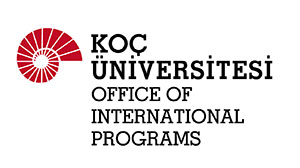November 16, 2020
Online Turkish Practice Hours (TPH) Continues in Fall ‘20 with Several Novelties
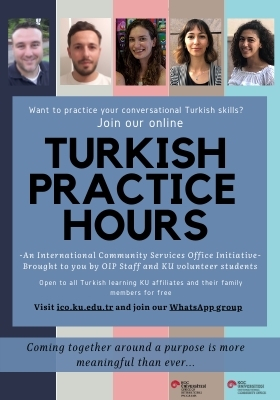 In Spring ‘20, the ICO started an online language practice community for Turkish learners at KU. TPH was formerly designed as an on-campus activity and was named “Turkish Coffee Hour”. The premise of this activity was originally to bring volunteer Turkish students with the members of our international community at KU and let them speak Turkish and we wanted to sponsor complimentary refreshments including coffee at each session. However, with the outbreak of the pandemic, the Turkish Coffee Hour was moved online and received great interest.
In Spring ‘20, the ICO started an online language practice community for Turkish learners at KU. TPH was formerly designed as an on-campus activity and was named “Turkish Coffee Hour”. The premise of this activity was originally to bring volunteer Turkish students with the members of our international community at KU and let them speak Turkish and we wanted to sponsor complimentary refreshments including coffee at each session. However, with the outbreak of the pandemic, the Turkish Coffee Hour was moved online and received great interest.
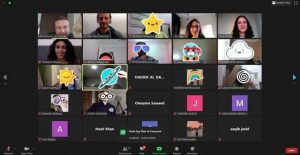
In Fall ‘20, TPH had novel changes. This semester, there are volunteers among the Office of International Programs (OIP) Staff to lead the practice hours in addition to students, and more online language practice games and culture & language talks are planned to achieve more interactive participation besides raising intercultural awareness among Turkish and non-Turkish participants alike.
TPH sessions started on October 22nd with approximately 30 participants and will be every Thursday between 5-7 PM during the semester. There is a special WhatsApp group for participants and volunteers to communicate, and the group has 125 members.
To learn more about it, you can visit https://ico.ku.edu.tr/get-involved/learn-practice-turkish/

A New Addition to Everybody’s Toolkit at KU
We are tremendously happy to introduce a new soft tool for everyone at KU. Every now and then almost each team or individual receives international guests at KU and often times the guests do not receive a comprehensive campus tour due to time constraints or the lack of a default campus tour with a consistent order of items to go over. International Community Office staff made a deliberate point this year to design a campus tour that anyone can take anywhere, along with the new conditions of Covid in mind. The tour is in PPT format and can be accessed via www.ico.ku.edu.tr. The PPT predominantly features images and copy about important facts such as the university’s history, Vehbi Koc Foundation, Vehbi Koc’s Life, and campus architecture. This electronic resource can be used by everyone at KU both as a sample for tour giving patrons and by those who cannot physically join a campus tour on campus. Please contact Mr. Mert Şanıvar and/or Mr. Zikri Mert Demircan for any questions or comments about the campus tour.

Let’s have an Insider’s Look from Her Words
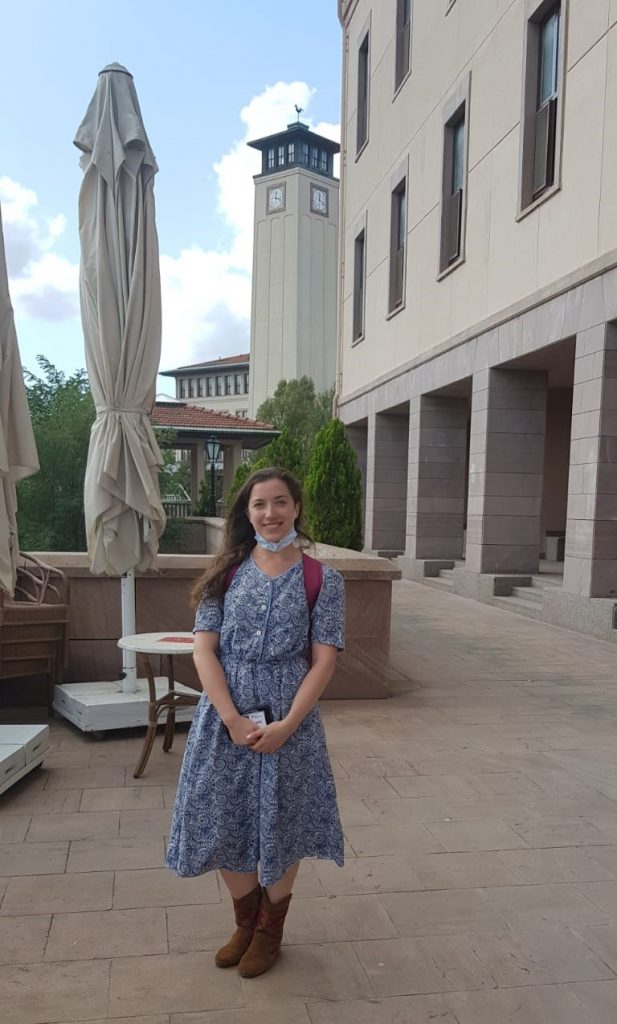 Meet Gyulten Hyusein. She is from Bulgaria and in her 2nd year at KU as a Ph.D. student in Cognitive Psychology. The ICO had an interview with her to portray an international KU student’s life at KU and in Istanbul. Below you can read her experiences and advises from her words:
Meet Gyulten Hyusein. She is from Bulgaria and in her 2nd year at KU as a Ph.D. student in Cognitive Psychology. The ICO had an interview with her to portray an international KU student’s life at KU and in Istanbul. Below you can read her experiences and advises from her words:
Q: Why did you choose to be in Türkiye? Anything special?
I am part of the Turkish minority in Bulgaria that has lived there for hundreds of years. I first thought about studying in Türkiye when I was a final year high school student. I thought going abroad for university could be a challenging and enriching experience but at the same time, I could learn more about Turkish culture and improve my mother tongue. So, I did my bachelor’s degree at Işık University and I have been in love with Türkiye and Istanbul ever since.
Q: Why KU?
I first visited Koç University in my first year as an undergraduate student at Işık and I was very much impressed by the unique beauty of its campus – both in terms of the surrounding nature and its architecture but also the thriving academic atmosphere. I later had the chance to attend undergraduate psychology lectures at KU and again I could understand why this university was so reputable both in Türkiye and around the world. It was simply because professors and students were doing their best to teach, learn, and advance. Then, years later, after completing my master’s degree at the University of Edinburgh and having decided to come back to Istanbul, I had no doubt where I wanted to go next to pursue my Ph.D. studies. No other university would enable me to advance and develop as a researcher better than KU. I don’t think I was mistaken.
Q: How is your life in Istanbul and on campus? Anything you find interesting, challenging?
Since I don’t live in the university’s lodgings but in a rented flat on the Anatolian side of Istanbul, before the pandemic, commuting to campus almost every day was very challenging for me. But it also had its upsides. I used to take the shuttle service for employees provided by KU, which meant I would be on campus at 7 am. That gave me the unique chance to watch the picturesque sunrise over the campus and start working earlier than most people and even choose any seat in the library I would like as there were no students there yet. Life in Istanbul can be very hectic and busy and having those silent moments in the mornings would recharge me for what was ahead of me during that day.
Q: What do you find interesting about Turkish culture?
Turkish culture is so rich and diverse that one can never get bored when living in Türkiye. Like many foreigners or at least as someone who wasn’t born and raised in Türkiye, I found the regular Turkish habits such as drinking Turkish tea round the clock, the constant honking and unpredictable driving of cars in Istanbul, the traditional Turkish bath that has been used for centuries, all very interesting and fascinating. However, two things I immediately fell in love with were the hospitality of the Turks and the heart-warming breakfast/brunch culture. I take these two with me wherever I go around the world!
Q: Are you active in any student club or any department? If yes, how and for how long?
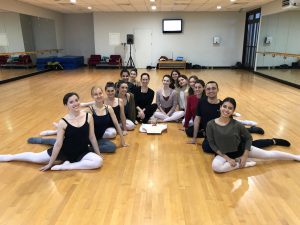 As a Ph.D. student, I can say that my lab (The Language and Cognition Lab at KU) has become my second family. We not only do research together but also celebrate important days and occasions together all the time. I very much prefer to spend time in our lab than in my office, because in the lab you can always find someone to cheer you up after long and excruciating hours of reading and writing manuscripts, someone to show you that little trick that fixes all your analyses, or just someone to go upstairs to the kitchen and get tea or coffee with. I also try to make time for my interests and hobbies aside from psychology and KU provides the perfect environment for that. Since my first semester here, I have been taking ballet and now pilates classes that help me stay fit and relax from the Ph.D. workload. This semester I also started auditing German language classes as a person who researches language(s) and its effects on the mind and brain, I am very fascinated by what foreign languages can do for your brain and your life in general. I would recommend that everyone should learn a second or even a third foreign language!
As a Ph.D. student, I can say that my lab (The Language and Cognition Lab at KU) has become my second family. We not only do research together but also celebrate important days and occasions together all the time. I very much prefer to spend time in our lab than in my office, because in the lab you can always find someone to cheer you up after long and excruciating hours of reading and writing manuscripts, someone to show you that little trick that fixes all your analyses, or just someone to go upstairs to the kitchen and get tea or coffee with. I also try to make time for my interests and hobbies aside from psychology and KU provides the perfect environment for that. Since my first semester here, I have been taking ballet and now pilates classes that help me stay fit and relax from the Ph.D. workload. This semester I also started auditing German language classes as a person who researches language(s) and its effects on the mind and brain, I am very fascinated by what foreign languages can do for your brain and your life in general. I would recommend that everyone should learn a second or even a third foreign language!
Q: If you would have a chance to share a memory or an interesting fact about Turkish culture or KU, what would it be?
I remember back in the summer of 2011, when I was on one of my first visits to Türkiye, a girl living in Istanbul asked me if I would ever consider going to university in Türkiye, I said “No, no way!”. One year later, I was packing most of my belongings to move to study in Türkiye. And I have never regretted that decision!
Q: How did the Corona outbreak change the way you live and think? How did it affect your academic studies, life with your family, etc.?
I think one of the most important lessons of the Corona outbreak for all people around the world was that we, as human beings, cannot be in control of everything, even not of our own lives. But also, we recognized the almost limitless opportunities that technology provides us with. I moved most of my research online and realized that sometimes it could work just as well as in lab settings. I had the chance to attend many online conferences, which I wouldn’t be able to if they took place physically. I also realized that even if before the pandemic it was very easy to get in touch with friends and family who are abroad. They were actually just a WhatsApp or Skype call away, we could never find time to call them, and during the first weeks and months of quarantine, I was very excited to get in touch with most of them. Of course, nothing could replace real face-to-face human interaction, but we should also be grateful for what we have in our technologically advanced age.
Q: If you had a chance, what advice you would give to other students or any KU international member?
University is a unique place where one can grow and expand themselves continuously. We find our closest friends there who sometimes become our family later in life. Each day at university is a day to learn, to explore, to make mistakes, to understand better, or to get more confused. So, we shouldn’t be afraid to live to the fullest as university students. For some of us, it could mean taking every opportunity that KU offers, double-majors, exchange years, interest groups and societies, volunteering, and other side projects; and for others, it could mean diving deeper into that particular area of interest using all the resources that are at our disposal at universities such as KU, renowned experts in almost every field, the latest technology for doing ground-breaking research, unconditional support from staff and academics. So, we should never be afraid to fail while progressing on the uneasy but very much satisfying and rewarding path of self- and academic growth.
